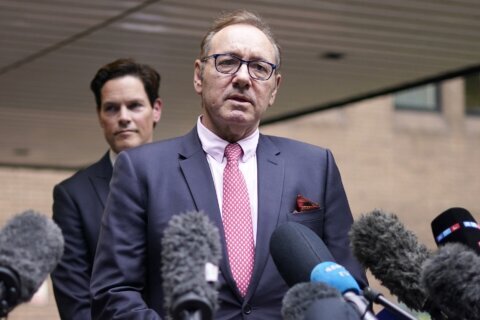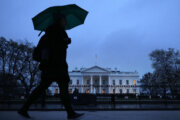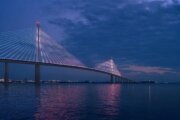The year was 2009 and Michael Green, four years removed from working as a staff member of the U.S. National Security Council in then-President George W. Bush’s administration, was meeting with Shinzo Abe. The Japanese politician was himself two years removed from his one-year stint as prime minister, a position he resigned from due to suffering from ulcerative colitis.
Green, the senior vice president for Asia and Japan chair at the Center for Strategic and International Studies, says he met with Abe to show him the results of the latest CSIS survey of foreign policy leaders in Asia.
“The result I showed him was interesting because in that CSIS data we asked, ‘What’s the greatest threat to peace in Asia?’, and Japan came in near the bottom.” North Korea was seen as the greatest threat, followed by China, India, Russia, the U.S. and then Japan, Green says. “Abe looked at that, and then he turned to me and said in Japanese, ‘Hmm, that’s a little disappointing.’ And it was not that he wanted Japan to be scary but he wanted Japan to be respected.”
Such will be part of the mixed legacy Abe leaves as he prepares to step down from his second tenure as prime minister of the world’s third-largest economy. Abe announced his decision on Aug. 28, citing the same health afflictions. In 2012 Abe had made a stunning political comeback, winning the leadership of the ruling conservative Liberal Democratic Party (LDP), and then returning to be prime minister. He leaves the role as Japan’s longest-serving prime minister.
Abe launched his program of “Abenomics” to bring the country out of deflation, strengthened the country’s military and moved to counter the growing influence of China. As a result, Japan has low rates of unemployment and crime, strong infrastructure and — critically in the era of the coronavirus pandemic — a low death rate from the COVID-19 disease. Today, Japan is arguably the most politically and economically stable country among the world’s large wealthy democracies.
But Abe also had major failures during his rule, perhaps the most high -profile being to deny that the Japanese Imperial Army had pressed Korean and other women — the so-called “comfort women” — into prostitution. That denial alienated Koreans, Chinese, Americans and Europeans. He leaves office unpopular with a Japanese public unhappy over a series of political scandals and his management of the economy during the coronavirus pandemic that has led to a record economic contraction this year.
U.S. News & World Report spoke with Green about Abe’s legacy, the contenders aspiring to be Japan’s next prime and the greatest challenges Abe’s successor will face. The interview has been edited for length and clarity.
[MORE: Japan Seen as Forward Thinking Nation]
What made Shinzo Abe unique compared to his predecessors as a post-World War II prime minister?
He had the longest tenure in office — that in itself was unique but also important for Japan’s influence. And he really put Japan at the center of U.S. strategy, the (President Donald) Trump administration’s signature policies in the region such as the Indo-Pacific strategy based on alignment with Australia and the other maritime democracies. They (the Trump administration) had nothing, they had no foreign policy strategy, and they basically took the Japanese strategy. To be historically accurate, (the policy) originally was American, but as Trump drifted off, Abe took this strategy, sold it to the Trump administration and they made it theirs.
In the G-7, he (Abe) held together this really important summit of democratic industrial leaders at a time of China’s coercive rise and Russian sabotage of the international system, and Donald Trump’s sabotage of the transatlantic relationship and the ruined U.S.- Canada relationship. So Abe really made himself the glue in the G-7.
The other thing I think historians will look back on was the way he transformed Japan’s security policy. Probably the most important part was the package of bills he passed in 2015 that, among other things, reinterpreted the Japanese Constitution. Article 9 of Japan’s Constitution says Japan renounces its right of war — it won’t have military forces for that purpose. He actually said he wanted to revise the Constitution. He didn’t, but what he did do, which may be more important, was he changed the interpretation of what all that means.
Until 2015, Japanese governments used Article 9 as an alibi. They used it to say to us (the U.S.) that ‘under the security treaty you guys can defend us but we’re unable to do anything to help you.’ Abe changed that, which he had to explain in well over 100 hours of debate in the Diet (Japan’s parliament). He said that Japan can operate with U.S. forces. The caveat is, if it’s a matter of national survival, the judgment is now in the prime minister’s hands.
He said ‘we in Japan are not going to do the kind of combat missions we associate with Britain or Australia’ — you know, dropping bombs. But they will be able to do things like escort U.S. aircraft carriers … provide supplies. And now whether or not Japan does that will be up to the prime minister at the time. That is a generational change.
Can you elaborate on how Japan changed domestically, politically, socially during his tenure?
He gave the Japanese people more confidence. They really lost confidence in March 11, 2011, when the huge tsunami and earthquake hit and the (previous) government basically couldn’t handle it. And then people were feeling very down. He brought back a sense of confidence to Japanese society. Some people criticize him for emphasizing patriotism and nationalism too much. But as he stayed in power, and as he got ready to push through those big changes on the security side, he backed away from the more controversial views he had — at least publicly.
[MORE: Japan’s Slow Recovery From the Tsunami]
Some people will say that he said very dangerous things about history and he was a revisionist. Initially in 2012-2013, that was a fair characterization. It’s not now. When you look at opinion polls in Asia or around the world, Japan is one of the most trusted countries — outside of Korea and China — in Asia. Japan by 10s of percentiles, like 80%-90%, compared to 40% for the U.S. or China, is the most trusted country in the region. So it’s not like he upset the region, other than (South) Korea.
How did Abe influence Japan’s economy?
In terms of the economy, new changes were brought to the stock market. They have a new set of indices that reward performance, rather than just stock valuation. And that spurred companies to innovate a bit more.
He successfully changed the debate about women; he brought more than 2 million women into the workforce, which is not an easy thing to do. I think there is no other case in recent history where a country did that. People will point out rightly that there’s still a huge change needed in norms within companies — that the infrastructure for day care is insufficient. But as a matter of public policy to bring that many women into the workforce, it is almost unprecedented. And he really reformed the tourism and service sectors, so Japan’s tourism grew, tripled, basically, under his tenure.
What he didn’t do was large-scale structural reform. Abe is a national security thinker, he’s not an economic reformer. That’s not who he is, and it’s probably not who his successor is going to be. But that’s sort of the next big historical figure in Japan. After Abe, who is going to be the one who takes on economic reform, a restructuring of the economy? I don’t see that happening in the middle of COVID, and in a transition that’s more about continuity than change.
How did Japan’s place on the world stage evolve during Abe’s stewardship — both regionally and globally?
Japan has for decades actually made it in the top-tier countries respected in the world. Abe made Japan not only respected but relied upon Japan to emerge as a reliable leader in the world. Abe has positioned Japan to be not only a respected country, but a country that the United States or Canada or Australia or India rely on. And to be honest, part of it is Trump. At a time when U.S. relations with Canada and Europe are deteriorating significantly, Abe has become the leader in the world who brings together these democratic, industrialized countries.
He did what (Justin) Trudeau and (Angela) Merkel and (Theresa) May and even (Boris) Johnson couldn’t do, which is he tolerated Donald Trump through 18 holes of golf, through multiple phone calls. I don’t know if you saw the Japanese press reported that now that he’s leaving office, Abe let it slip, that working with Trump was completely exhausting.
Do you see any favorites who will become the next leader of the Liberal Democratic Party and subsequently, the next prime minister of Japan?
It’s changing every day. His current obvious choice is Chief Cabinet Secretary (Yoshihide) Suga. He is kind of like the chief operating officer. He disciplines the cabinet. He disciplines the bureaucracy. He’s a quiet, behind-the-scenes, thoughtful guy; everyone’s afraid of him. He’s a nice guy, but he’s the executive officer, if you will, the CEO over there and would represent the most continuity.
All the other contenders are basically in Abe’s worldview. (Fumio) Kishida, the former foreign minister, is an affable, not terribly colorful leader, but with more of a public profile because of his foreign ministry role. Another contender is the previous foreign minister, Tar? K?no. He’s a maverick, a colorful guy. But it’s probably not his time. And then you’ve got (Toshimitsu) Motegi, the current foreign minister who’s in the mix.
The most likely scenario is that Suga, if he wins, he’ll probably continue Abe’s general direction. He probably won’t take a lot of high-profile moves in foreign policy and focus on COVID and try to spur the Japanese economy, but less in major structural forms. If he doesn’t do well in the election, then it’s up for grabs and the press and the LDP will look and say, ‘All right, who would capture the public’s imagination and keep us in power?’
More from U.S. News
Warnings Over Japan, Other Countries Subsidizing Tourism
Japan Seen as Most Forward Thinking Country
The 25 Best Countries in the World
Shinzo Abe Leaves Mixed Legacy in Japan originally appeared on usnews.com







